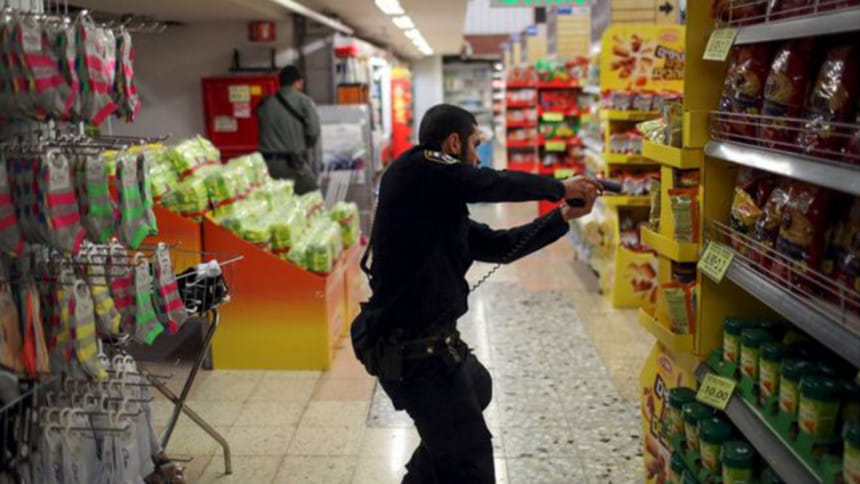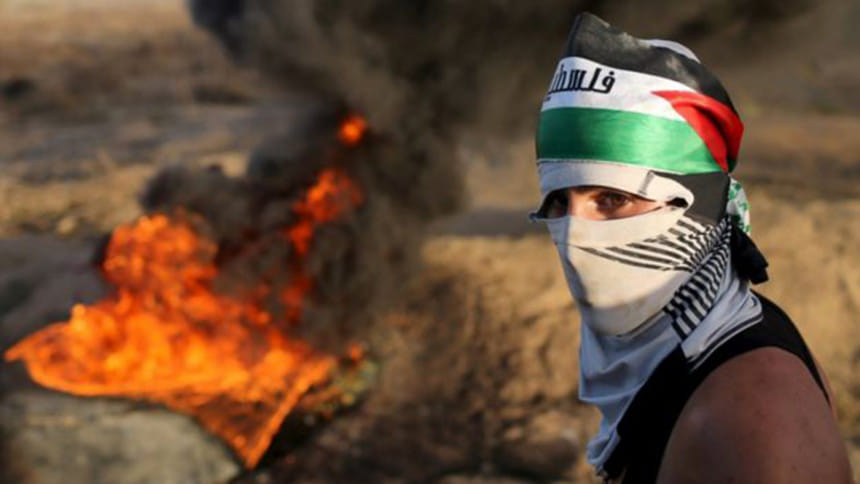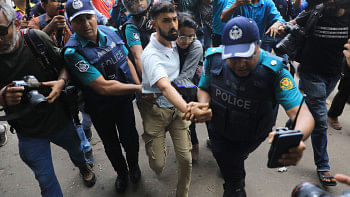Attacks continue in Jerusalem despite new checkpoints

Attacks have continued in parts of Jerusalem only hours after Israeli forces launched a major security operation in Arab areas of the city.
On Wednesday morning police blocked entrances to Jabal Mukaber, a district that was home to three men accused of killing three Israelis on Tuesday.
Hours later, police said they shot dead a Palestinian who stabbed an Israeli woman at Jerusalem's main bus station.
A Palestinian also tried to stab a policeman near the walled Old City.
He too was shot dead by police, they added.
Since the beginning of October, seven Israelis have been killed and dozens wounded in shooting and stabbing attacks, the Israeli authorities say.
At least 30 Palestinians have also been killed, including assailants, and hundreds have been injured, according to the Palestinian health ministry.
In other developments:
-US State Department spokesman John Kirby said the White House was "concerned" at "reports of security activity that could indicate the potential excessive use of force" by Israeli authorities
-The White House and State Department confirmed that Secretary of State John Kerry would travel to the region soon, without giving more details
-In an interview with the Jerusalem Post, Kirby tried to downplay comments made by Kerry indicating he believed Israel's settlements policy was to blame for the violence
Speaking for the first time since the upsurge in violence began, Palestinian Authority President Mahmoud Abbas said Israeli actions were "threatening to spark a religious conflict that would burn everything".
He also accused Israel of carrying out "executions of our children in cold blood", highlighting the case of a 13-year-old Palestinian boy who was shot by Israeli police after he and a 15-year-old stabbed an Israeli on Monday.
Israeli Prime Minister Benjamin Netanyahu has described the Palestinian leader's comments as "lies and incitement", adding that the boy was alive in hospital, the Jerusalem Post reports.
He said on Tuesday the new security measures were aimed at "those who try murder and with all those who assist them".
On Tuesday night, Israel's security cabinet authorised police to close or surround "centres of friction and incitement" in Jerusalem.
It also announced that the homes of Palestinians who attacked Israelis would be demolished within days and never rebuilt, and that their families' right to live in Jerusalem would be taken away.
On Wednesday morning, police said checkpoints were set up at "the exits of Palestinian villages and neighbourhoods in East Jerusalem".
Hundreds of soldiers were also deployed.
Human Rights Watch warned that locking down parts of East Jerusalem would "infringe upon the freedom of movement of all Palestinian residents rather than being a narrowly tailored response to a specific concern".
On Wednesday, Israeli police and Palestinians clashed in the West Bank city of Bethlehem after the funeral of a Palestinian man killed in violence the previous day.

Clashes were also reported along the Israeli border with Gaza.
The BBC's Yolande Knell in Jerusalem says the violence, coming at a time when peace prospects seem dim, has fuelled a sense of panic in Israel and raised fears of a new Palestinian uprising, or intifada.
What is happening between Israelis and Palestinians?
There has been a spate of stabbings of Israelis - several of them fatal - by Palestinians since early October, and one apparent revenge stabbing by an Israeli. The attackers have struck in Jerusalem and central and northern Israel, and in the occupied West Bank. Israel has tightened security and its security forces have clashed with rioting Palestinians, leading to deaths on the Palestinian side. The violence has also spread to the border with Gaza.
What's behind the latest unrest?
After a period of relative quiet, violence between the two communities has spiralled since clashes erupted at a flashpoint Jerusalem holy site in mid-September. It was fuelled by rumours among Palestinians that Israel was attempting to alter a long-standing religious arrangement governing the site. Israel repeatedly dismissed the rumours as incitement. Soon afterwards, two Israelis were shot dead by Palestinians in the West Bank and the stabbing attacks began. Both Israel and the Palestinian authorities have accused one another of doing nothing to protect each other's communities.
Is this a new Palestinian intifada, or uprising?
There have been two organised uprisings by Palestinians against Israeli occupation, in the 1980s and early 2000s. With peace talks moribund, some observers have questioned whether we are now seeing a third. The stabbing attacks seem to be opportunistic and although they have been praised by militant groups, Palestinian leader Mahmoud Abbas has said Palestinians are not interested in a further escalation.

 For all latest news, follow The Daily Star's Google News channel.
For all latest news, follow The Daily Star's Google News channel. 



Comments